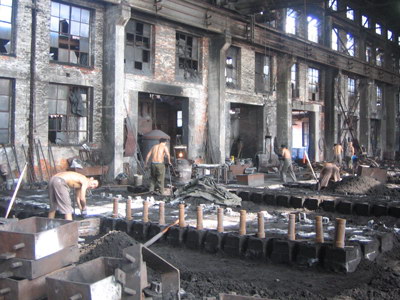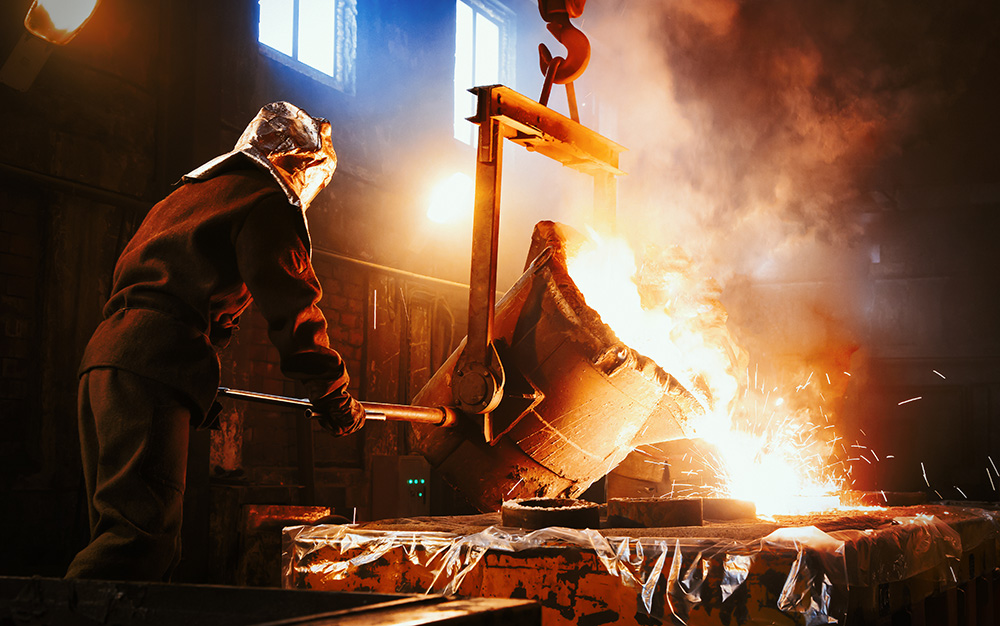Why choose an Aluminum Foundry the best option for precision manufacturing
Wiki Article
Just How a Metal Foundry Adds To Lasting Metal Manufacturing Practices
Metal foundries play a crucial duty in advertising sustainability within the metal production market. By integrating recycled materials, they decrease reliance on virgin resources and decrease environmental influences. Energy-efficient melting procedures additionally lessen energy usage and discharges. The trip toward lasting methods entails even more than just reusing and energy management. It encompasses a more comprehensive commitment to ethical sourcing and innovative modern technologies. The implications of these practices are considerable and warrant closer assessment.The Function of Recycling in Metal Foundries
While metal manufacturing has actually commonly counted on virgin products, the boosting focus on sustainability has caused a substantial change in techniques, particularly in metal foundries. Recycling has actually emerged as an essential component of this makeover, allowing foundries to repurpose scrap metal and minimize reliance on mined resources. By incorporating recycled materials into their procedures, foundries not only decrease ecological influence but also lower manufacturing prices.Using recycled steels, such as aluminum, steel, and copper, minimizes energy consumption and reduces greenhouse gas exhausts linked with conventional mining and refining techniques. Foundries can accomplish premium outcomes by using innovative sorting and handling innovations to ensure the purity of recycled products. This emphasis on reusing fosters a round economic situation, where waste is reduced, and sources are made use of successfully. Consequently, metal foundries play a pivotal role in promoting sustainable methods within the metal production industry.
Energy-Efficient Melting Methods
Energy-efficient melting methods are essential for improving sustainability in metal manufacturing. These techniques substantially minimize energy consumption throughout the melting procedure, which is one of the most energy-intensive phases in metal manufacturing. Technologies such as induction melting, resistance heating, and microwave melting offer enhanced performance compared to traditional methods. Induction melting, as an example, utilizes magnetic fields to produce warm straight within the metal, minimizing energy loss and supplying exact temperature level control.In addition, executing warmth healing systems can better improve performance by recording and reusing waste warmth generated during melting. Utilizing sophisticated insulation products and enhancing furnace layouts additionally add to energy savings. By taking on these ingenious melting techniques, metal foundries can decrease their carbon impact, decrease operational costs, and add to an extra sustainable production landscape. The combination of energy-efficient methods not only aligns with ecological goals but likewise satisfies the expanding demand for responsible production methods in the metal sector.
Lasting Sourcing of Raw Materials
Sustainable sourcing of resources is essential for minimizing the environmental effect of metal production. This entails the increased utilization of recycled metals, the adoption of honest mining techniques, and efforts intended at neighborhood sourcing. By prioritizing these approaches, the market can promote responsible source monitoring and support local economies.
Recycled Metal Usage
Exactly how can industries efficiently decrease their environmental influence while fulfilling the expanding need for metal? One significant method is the application of recycled metal. By including scrap metal right into their manufacturing processes, foundries can lower the removal of virgin materials, therefore saving natural deposits and minimizing energy consumption. Recycled steels require less energy to procedure contrasted to their raw equivalents, leading to lower greenhouse gas discharges. In addition, the usage of recycled metal helps divert waste from landfills, promoting a circular economic situation. Industries that prioritize recycled metal not just add to sustainability yet additionally benefit from price savings related to reduced product purchase. Recycled metal usage stands as a vital method for ecologically accountable metal manufacturing.Honest Mining Practices
While the demand for steels proceeds to climb, markets are progressively recognizing the significance of ethical mining methods in making sure liable sourcing of basic materials. Honest mining encompasses a dedication to ecological stewardship, social responsibility, and adherence to reasonable labor techniques. Firms are currently focusing on partnerships with mines that show openness in their procedures, lessening eco-friendly impact and valuing regional areas. This approach not only fosters a sustainable supply chain however likewise boosts the credibility of businesses entailed. By executing strenuous criteria and accreditations, industries can deal with prohibited mining activities and advertise the welfare of employees. Inevitably, ethical mining techniques add considerably to an extra sustainable metal manufacturing ecological community, aligning financial development with environmental and social honesty.Local Sourcing Efforts

Advancements in Metal Casting Procedures
Innovations in metal casting processes are transforming the market by including advanced recycling techniques that minimize waste. Energy-efficient melting techniques are also being developed to decrease energy consumption during production. Furthermore, making use of cutting-edge mold and mildew materials adds to improved efficiency and sustainability in casting procedures.Advanced Recycling Techniques
Advanced recycling strategies are changing metal casting processes, greatly improving sustainability in the market. These developments concentrate on recycling and recovering scrap metal, considerably minimizing waste and the demand for virgin products. Techniques such as hydrometallurgy and pyrometallurgy make it possible for foundries to remove useful steels from used parts, making sure reliable source usage. Furthermore, advanced sorting and purification modern technologies improve the quality of recycled steels, making them suitable for high-performance applications. This not only reduces the ecological footprint of metal manufacturing yet likewise fosters a round economic climate by promoting the reuse of materials. As these reusing methods remain to evolve, they assure to further enhance procedures within foundries and add to a much more lasting metal production landscape.Energy-Efficient Melting Methods
While traditional melting techniques have long been the foundation of metal casting, current improvements have introduced energy-efficient strategies that considerably reduce power intake and emissions. Technologies such as induction melting and electrical arc furnaces have gained prestige, permitting exact control over temperature and minimizing the demand for fossil gas. These methods not just boost energy efficiency however also promote quicker melting times, which converts to lower operational prices. Furthermore, technologies in warm recuperation systems allow foundries to capture and reuse excess warmth generated during the melting procedure. This all natural method to energy administration not only supports sustainable practices however additionally placements metal foundries as leaders in the change towards greener production procedures, additionally straightening with international sustainability objectives.Ingenious Mold Materials
As the demand for more reliable and lasting metal casting procedures grows, the exploration of cutting-edge mold materials has actually ended up being a centerpiece in the industry. Conventional mold and mildew materials often add to environmental obstacles, prompting the search for alternatives that minimize waste and power intake. Current advancements include the development of naturally degradable binders and recyclable compounds, which not just enhance mold and mildew performance but also lessen eco-friendly influence. Additionally, using 3D printing technology in mold creation enables elaborate designs that minimize product use and make it possible for quick prototyping. These cutting-edge materials not only boost casting accuracy yet likewise align with sustainability goals, showcasing the sector's dedication to minimizing its carbon impact while keeping high-grade production criteria.Reducing Waste With Advanced Modern Technology
Innovative modern technologies are changing the metal manufacturing market by significantly reducing waste and enhancing performance. Advanced data analytics and artificial intelligence formulas enable foundries to optimize production procedures, reducing and recognizing inadequacies scrap product. Smart sensors monitor equipment efficiency in real-time, permitting predictive maintenance that decreases downtime and waste generation. In addition, additive production techniques, such as 3D printing, allow for the production of complicated components with minimal product usage, noticeably lowering waste contrasted to typical methods.
In addition, closed-loop systems are becoming extra prevalent, wherein scrap metal and byproducts are reused back into the manufacturing cycle, making sure that materials are used to their maximum possibility - Metal Foundry. This assimilation of innovation not just promotes source preservation but also improves the general sustainability of metal production techniques. By accepting these improvements, foundries can contribute to a much more sustainable future while maintaining competition in the market
The Effect of Foundries on Carbon Impact Decrease
Foundries play a crucial function in reducing the carbon footprint of the metal production sector by implementing different sustainable methods. By making use of energy-efficient innovations, such as electrical arc heaters, these centers significantly lower greenhouse gas emissions compared to standard methods. Additionally, foundries progressively adopt sustainable energy sources, which additionally diminishes their dependence on nonrenewable fuel sources.Reusing scrap metal is another essential technique that foundries use, conserving sources and minimizing the requirement for virgin materials. This not only lessens waste but likewise reduces down on the energy-intensive extraction procedures associated with mining. Furthermore, the fostering of closed-loop water systems assists to lessen water usage and reduce wastewater discharge, adding to a more sustainable operation.
With these initiatives, foundries show their commitment to environmental stewardship, resulting in a significant decrease in the overall Aluminum Casting carbon impact of the metal manufacturing industry. Their continuous initiatives are critical in the shift toward a more lasting commercial landscape.
Often Asked Inquiries
What Kinds of Metals Are Most Generally Recycled in Foundries?
Light weight aluminum, copper, brass, and steel are among the most generally recycled steels in foundries. These metals are favored as a result of their high recycling rates, financial worth, and extensive accessibility, contributing greatly to commercial sustainability initiatives.Just How Do Foundries Make Sure the Top Quality of Recycled Materials?
Foundries identify the quality of recycled products through extensive testing, arranging, and filtration processes. They implement innovative innovations to assess composition and remove pollutants, assuring that the recycled metals meet sector requirements for efficiency and safety and security.
What Certifications Exist for Lasting Foundry Practices?
Different accreditations exist for lasting foundry practices, consisting of ISO 14001 for ecological administration, ISO 50001 for energy monitoring, and LEED qualification for lasting building methods (Aluminum Casting). These certifications assist assure adherence to environmental and sustainability requirements in operationsJust How Do Foundries Gauge Their Carbon Footprint Decrease?
Foundries measure carbon footprint decrease through devices like lifecycle assessments, power audits, and emissions tracking systems. They compare standard discharges to existing outputs, examining renovations in energy effectiveness, material use, and renewable resource fostering with time.What Are the Economic Advantages of Sustainable Metal Manufacturing?
Sustainable metal manufacturing provides financial benefits such as decreased functional expenses, raised efficiency, enhanced market competitiveness, and prospective government incentives. In addition, it fosters innovation and brings in ecologically conscious customers, inevitably driving lasting productivity for businesses.Metal foundries play a vital duty in promoting sustainability within the metal manufacturing market. While metal production has commonly depended on virgin products, the enhancing focus on sustainability has actually led to a substantial change in techniques, especially in metal foundries. By integrating scrap metal right into their manufacturing processes, foundries can lower the extraction of virgin products, thereby preserving all-natural resources and minimizing energy intake. Foundries play a necessary role in decreasing the carbon impact of the metal production market by applying different sustainable practices. Recycling scrap metal is one more essential practice that foundries use, conserving sources and reducing the demand for virgin products.
Report this wiki page